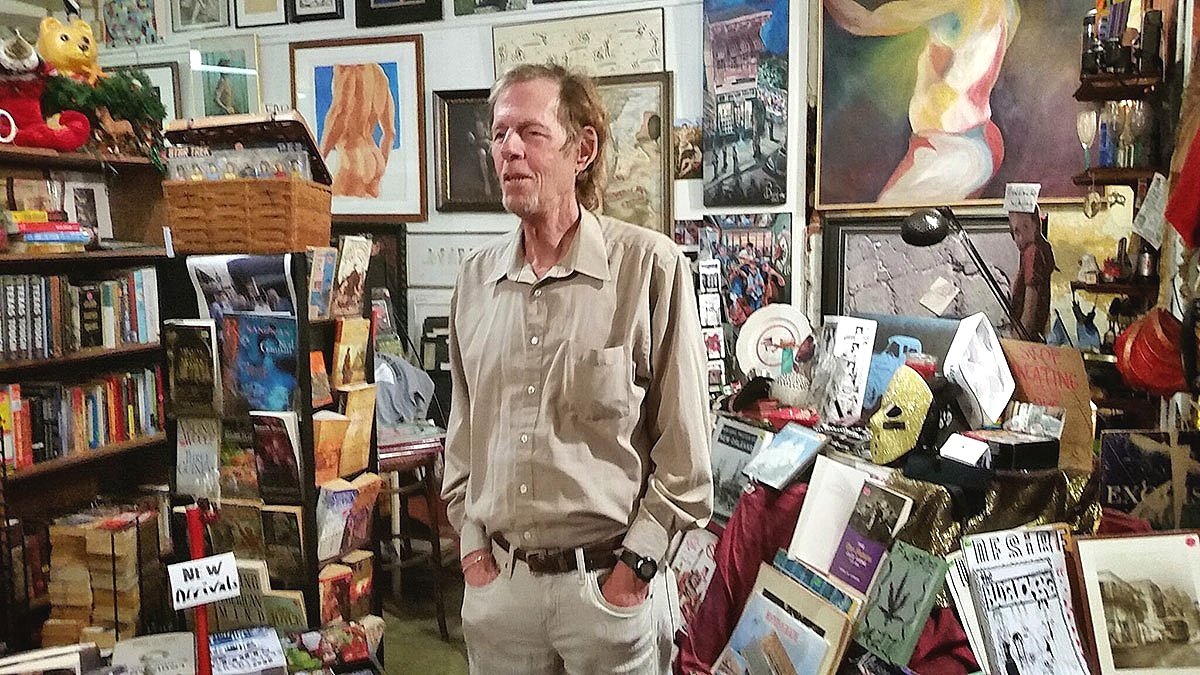Otis Fennell: Mayor of Frenchmen Street
Otis Fennell in Frenchmen Art & Books, 2014 by David Zalkind
April 2024What began in 1978 as the first gay bookstore in the South is still thriving as Frenchmen Art & Books thanks to four nurturing owners – including the late Otis Fennell.
– by Frank Perez
It is a sunny afternoon in 1981. A woman loiters at the intersection of Chartres and Frenchmen streets. She wants to enter the FM Bookstore, but she is apprehensive. It’s a queer book shop and no one knows she is a lesbian.
A few days earlier she narrowly escaped going to jail when the police arrested dozens of women for obstructing the sidewalk outside two lesbian bars on N. Rampart Street. She’s not a drinker and she doesn’t care for bars, but lesbian bars were where you went to meet other lesbians. In a very closeted world, gay bars were one the few places you could go to “be gay.” But that was risky because of all the police raids. Surely, they wouldn’t raid a bookstore, she reassures herself.
An arrest would mean her name would be published in the paper and she would probably be fired from her job – as well as evicted from her apartment. Worse still, her family might ostracize her. Would the risk be worth it?
Yes, she decides, and enters the shop. The proprietor greets her warmly and then carries on about his business. She immediately feels more relaxed. As she browses, she feels even more comfortable. She feels she is not alone. She feels connected. She feels.
Frenchmen Art & Books on a recent Saturday night. The independent bookstore first opened 46 years ago. Photo by Ellis Anderson
Such was the emotional life of those in the closet in decades past. Until recently, New Orleans was much more homophobic than young people now can possibly imagine. The little bookstore on Frenchmen Street was a public queer space at a time when few others existed.
The bookstore was founded by Tom Horner, who in 1977 came out to himself and left the Episcopal priesthood. His personal journey of self-acceptance had led him to write a book, Jonathan Loved David: Homosexuality in Biblical Times. After it was published in 1978, Horner moved to New Orleans and opened the bookstore on Frenchmen Street. It was the first gay / lesbian / feminist-themed bookstore in the South.
Horner’s book at the bookstore he founded
Horner opened FM Books (Faubourg Marigny Books) with less than a hundred titles. At the time, the gay publishing industry was in its infancy. Ten years earlier, gay activist Craig Rodwell had opened the Oscar Wilde Memorial Bookshop in Greenwich Village, but it wasn’t until after the 1969 Stonewall riots in NYC, a watershed moment in gay history that gay-themed presses and bookstores began to proliferate in order to accommodate the growing number of gay titles. By 1994, there were forty-five gay and lesbian-themed bookstores across the nation. Of these, only a handful now remain.
Horner ran FM Books for ten years before retiring to California. During his tenure, New Orleans was still a very closeted place and the queer community in the French Quarter faced discrimination at every turn. Police raids of gay bars were still commonplace and beat cops in the Quarter would often stop pedestrians who “looked gay” in order to compile biographical information on them.
Going to a gay bookstore was daunting for some, but the feeling of just being in a queer space was worth the risk. Patrons at FM Books weren’t just buying gay, they were being gay. The shop was a de facto community center for the LGBT+ community.
When Horner retired, well-known New Orleans gay activist Alan Robinson then took over the store and ran it for the next sixteen years. Robinson had demonstrated an acute political consciousness as an anthropology student at the University of Illinois and became active in the local gay rights scene after he moved to New Orleans in 1975.
For a while he worked at the Gay Service Center (a short-lived community outreach effort started by Mike Stark) before co-founding the Gertrude Stein Society with Bill Rushton and Ann Gallmeyer.
At the bookstore, Robinson brought in more titles and hired a staff. He also began hosting signings for gay and lesbian authors visiting New Orleans. Johhny Townsend (author of Inferno in the French Quarter), who worked part-time at the store in the late 1990s, recalls:
“I remember Patricia Nell Warren, and Barbara Peabody (who wrote The Screaming Room, an AIDS memoir), and Vito Russo of The Celluloid Closet, and Aaron Lawrence (who wrote two books about escorting). I read my one solitary porn story, set in the bookstore, and published in Indulge, at a reading while wearing my leather. Alan always had plenty of refreshments for all his signings, though I doubt he made very much money from any of them.”
In addition to promoting queer authors, Robinson also founded, along with Uptown bookseller Mark Zumpe, the New Orleans / Gulf South Booksellers Association.
By the early 2000s, Robinson was not in the best of health and moved to Texas to be with his family. In 2003, M. K. Wegmann, the owner of the building which housed FM Books, approached the late Otis Fennell and asked him to help her find someone willing to run the store. Fennell took over the lease in July of 2003.
Otis Fennell as a young man at the Jazz and Heritage Festival, photo courtesy Tiffany Teixidor
Otis Fennell, flanked by his daughters, courtesy Tiffany Teixidor
Fennell grew up in Mississippi before earning an MBA at L.S.U. After moving to New Orleans, he became director of research for the New Orleans Chamber of Commerce in the 1970s. In 1973, before he came out, Fennell married a woman and had two daughters. The couple divorced in the early 1980s when Fennell came out as gay. The separation was amicable and the two remained best friends. In 1983, Fennell played a role in the creation of the NO/AIDS Task Force (now known as Crescent Care) and eventually served on its Board of Directors.
Fennell changed the name of the bookstore to FAB: Faubourg Marigny Art and Books. In addition to bringing in art, he also began stocking books about New Orleans and creating window displays. When he took over the store, Fennell had no experience in bookselling. “I had no experience, but I wanted to save the institution. Six months later I asked myself what the fuck have I done?”
Otis Fennell at Frenchmen Art & Books, photo by David Zalkind
Fennell had a keen sense of history and preserving LGBT+ culture was extremely important to him. Part of the impulse to keep that heritage alive was an awareness of the role the bookstore had played in the local queer community.
Culturally, FAB was significant not only because it was the only predominantly gay-themed bookstore in New Orleans, but also because it was one of just a few independent gay bookstores in the nation that survived into the internet age.
One of the windows at Frenchmen Art & Books, featuring a painting by artist Amzie Adams, 2024 by Ellis Anderson
Before the internet transformed the way everyone lives, gay bookstores functioned as spaces that fostered community building and served as an alternative to bars and porn shops.
Suzanna Danuta Walters, writing about coming out in Philadelphia in the 1970s, says of patronizing gay and lesbian bookstores, “Perhaps we were ‘buying gay,’ but I think the patronage of those bookstores felt more like ‘being gay’ in a world in which the spaces for that openness were severely limited.”
Thankfully, “being gay” is no longer as difficult as it once was. Unfortunately, selling hardcopy books is. Independent bookstores are virtually extinct in the rest of the country and independently owned gay bookstores have long been on the endangered species list.
In 2018, when Fennell’s health took a turn for the worse, he sold the bookstore to his longtime friend, David Zalkind. After the sale, Fennell would often wander down to the store and hold court there in the afternoons, thus maintaining his reputation as the “Mayor of Frenchmen Street,” until he passed away recently.
FAB’s current owners, Gretchen and David Zalkind in April 2024, photo by Ellis Anderson
Stephanie Reed painting of Frenchmen Art and Books, used with permission of the artist
As a closeted young man, Fennell could never have imagined how different the world would be at the end of his life – nor could he have imagined the role he would play in bettering life for the New Orleans queer community.
Fennel was fortunate to live long enough to see a major paradigm shift in the way society views LGBT+ people. The young lesbian who was so nervous about being seen entering the gay bookstore in 1981 no longer has to worry about being outed. New Orleans is a much more inclusive place and part of the credit for that goes to Otis Fennell.
Otis Fennell in Frenchmen Art & Books, 2014, photo by David Zalkind
Since we don't have a firewall, we depend on reader donations to make stories like this one possible:












